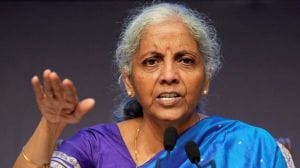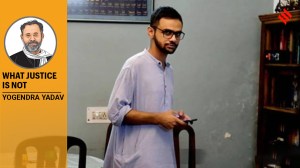Stay updated with the latest - Click here to follow us on Instagram
No ‘e-mulaqat’ for inmates with families abroad due to security reasons, Tihar jail tells Delhi HC
Pinjra Tod activists Natasha Narwal and Devangana Kalita had sought video conferencing facility for Tihar jail inmates whose families were abroad.
 Among several prayers, Natasha Narwal and Devangana Kalita sought a permanent facility of ‘e-mulaqat’ or video conferencing from jail, equal in timing to physical meetings; access to medical professionals; access to resource persons for completing education etc. (Express file photo by Gajendra Yadav)
Among several prayers, Natasha Narwal and Devangana Kalita sought a permanent facility of ‘e-mulaqat’ or video conferencing from jail, equal in timing to physical meetings; access to medical professionals; access to resource persons for completing education etc. (Express file photo by Gajendra Yadav)In a plea moved by Pinjra Tod activists Natasha Narwal and Devangana Kalita seeking video calling facility for inmates in Tihar jail whose families are abroad, the jail authorities informed the Delhi High Court on Friday that the same is not provided due to “security reasons”.
A single judge bench of Justice Yashwant Varma was hearing a plea by Narwal and Kalita, who were granted bail along with Asif Iqbal Tanha on June 15, 2021, after their arrest in the North East Delhi riots conspiracy case under the stringent Unlawful Activities Prevention Act (UAPA).
When the matter was called on Friday, the counsel for the petitioners submitted that the plea was filed when they were arrested in 2020 and most of the reliefs had been addressed. It was submitted that only the issue about the availability of video conferencing or ‘e-mulaqat’ facility for inmates whose relatives may be outside the country remained.
“We had said that the verification of relatives can be done by the consulate concerned,” the petitioners’ counsel said, adding that it has not been explained by the state why verification cannot be done and “it has only been said that it is a security concern”.
The counsel for the state of Delhi submitted that a status report has been filed on September 17. The status report filed by the superintendent of Central Jail No. 6, Tihar Jail states that “video-calling facility/e-mulakats are not provided for families of inmates residing abroad due to security reasons however, telephonic voice calls are permissible once a week to the inmate whose family members are residing abroad, on request”.
The report further states that every foreign prisoner is allowed to have a legal interview for the preparation of an appeal or for procuring bail or for any other legal purpose. The prisoner is allowed to have legal interviews twice a week like other prisoners.
“The foreign prisoners are also given consular access (in) accordance with the rules. Consulate officials of a foreign country are allowed to visit or interview a prisoner for arranging legal representation for them or for any other purpose only subject to approval of appropriate government authority,” the report states.
During the course of the hearing on Friday, the counsel for the state of Delhi said that prisoners can avail of the daily calling facility, to which the petitioner’s counsel replied that not all inmates may be able to avail of it due to the high charges (starting from Rs 400).
The high court thereafter asked the counsel for the state and observed, “I can understand the facility being abused for criminal enterprise. But for ordinary inmates…” The petitioners’ counsel thereafter submitted that “there is no question of security threat being there”.
The high court conveyed to the counsel appearing for the state of Delhi that the court wants to hear the matter and listed it for hearing on February 9, 2023.
While still in jail, Narwal and Kalita had moved the high court in April 2021 stating that ‘physical mulaqat’ at prisons in Delhi had been suspended in the wake of the rising number of Covid cases in the national capital, and prisoners were only allowed ‘e-mulaqat’ with family members thrice a month for 15 minutes each. Earlier, they would be allowed eight physical meetings a month for 30 minutes each. The high court had last year suggested that the ‘e-mulaqat’ can be increased to four a month so that prisoners can avail the opportunity once a week.
While Narwal told the court last year that the computer centre is not functional at the prison, Kalita told the court that regular contact with family members is essential for prisoners and due to the digital divide in the country, family members of many inmates do not have smartphones. “Right now there is so much unemployment and loss of livelihood, their families do not have money to buy data packs. Such kind of minimal basic physical mulaqat should be made available for them,” she submitted before the court last year.
Kalita had also submitted before the court that the process of getting permission to have a daily phone call for five minutes is very tedious and requires a post-paid connection on the other side, which “inmates who come from socially disadvantaged backgrounds are unable to procure”.
“There are inmates whose families cannot access e-mulaqat and do not even have money to travel to physically visit but at least have a small phone with them,” she told the court, seeking options for contacting families.
Among several prayers, the two activists sought a permanent facility of ‘e-mulaqat’ or video conferencing from jail, equal in timing to physical meetings; access to medical professionals; access to resource persons for completing education etc.







